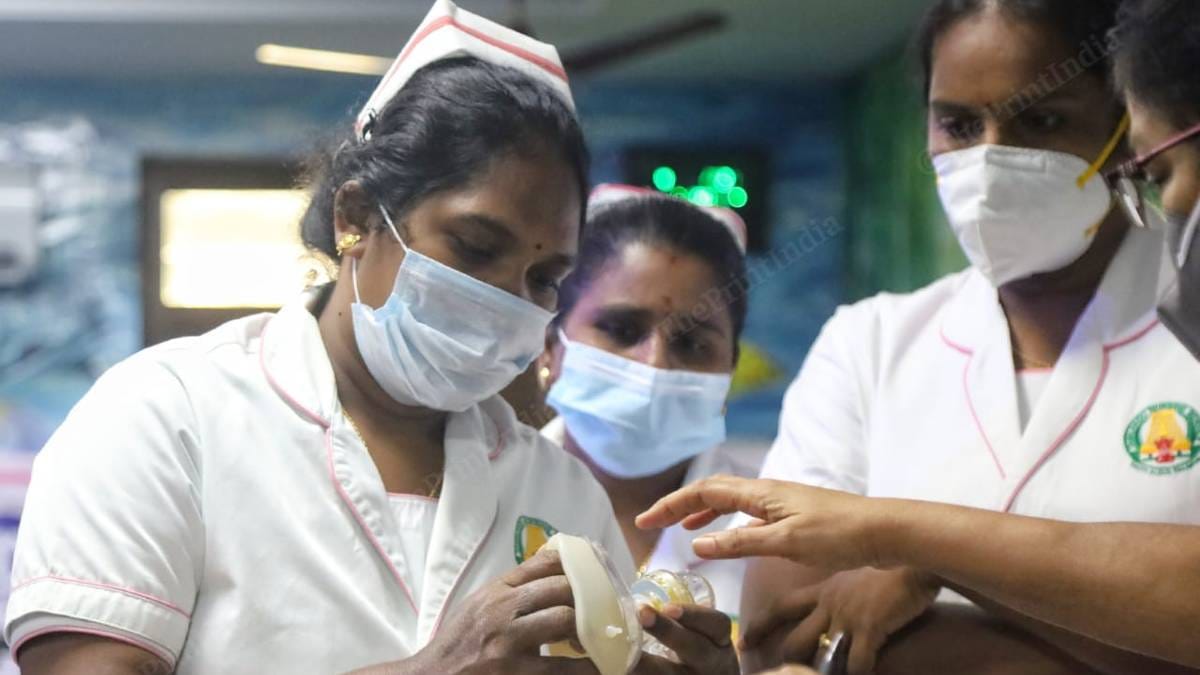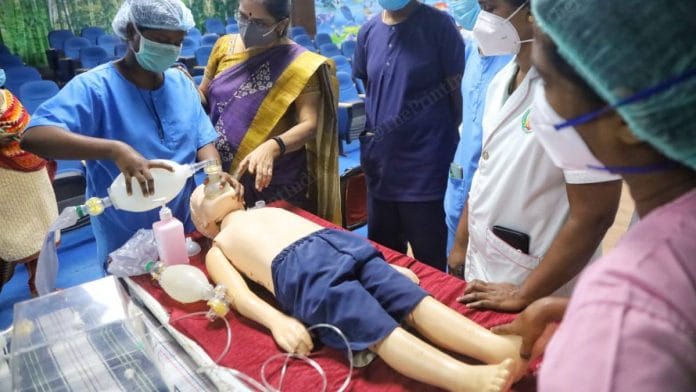Chennai: Scientists may have said there is no evidence that a potential third wave of coronavirus infections will affect children more, but Tamil Nadu isn’t taking any chances. It has already started training thousands of nurses in how to resuscitate infants and give them IV injections, and more importantly, what not to do. The training is being conducted on Zoom sessions and offline with dummy children.
“We don’t want any child to die at your hands,” said Dr Poovazhagi, from Chennai’s Institute of Child Health and Hospital for Children (ICH and HC) during one such training session Wednesday that ThePrint observed.
During the second wave, Tamil Nadu struggled for oxygen despite its strong public health infrastructure. Now, the medical infrastructure is already being ramped up to prepare for a possible third wave.
Virologist Gagandeep Kang has explained that one could not predict the third wave in India or about how it would hit children.
“There is no official basis, but we have seen in other countries there have been more paediatric cases. So we are taking no chances. We are reserving 25 per cent beds for children and training nurses for handling paediatric cases, as well as (training) doctors who are not paediatricians,” said Tamil Nadu Health Secretary Dr. J. Radhakrishnan.
Tamil Nadu is not the only state taking such precautions to ensure safety of children in case of a third wave. Addl.DG (media & communications) at Ministry of Health & Family Welfare, Manisha Verma told ThePrint that all states are doing paediatric Covid care training for doctors, nurses, specialists, frontline workers.
Meanwhile, Karnataka is starting child care divisions in each district hospital. In Maharashtra, the government is ensuring there are enough paediatric intensive care unit (ICU) beds, separate wards for children and pregnant women and training for adult intensivists and nurses for paediatric care.
The training for nurses in Tamil Nadu began in late July and is being organised by the Tamil Nadu chapter of the Indian Academy of Pediatrics (IAP). Sessions will continue till the end of August and the aim is to train over 30,000 nurses across the state, both in the government and private sector.
Also read: Poor contact-tracing & containment behind Kerala’s Covid surge, central team says in report
‘Handling a child a different skill’
Most of the training for nurses to handle Covid care for children takes place in the virtual medium through Zoom sessions, thrice a week, for three hours. Approximately 3,000 nurses tune in. If any of them are unable to attend the live session, there is a recap available on YouTube.
Dr Poovazhagi, in charge of the ICU at the Institute of Child Health, explained that the sessions had four modules that focussed on how to recognise and treat a child infected with Covid. The sessions also touch upon how to prevent the spread of the infection among youngsters.
The training involved instructions on providing physical and psychological care. If on the one hand the nurses were taught how to give children the extra care they needed – whether while giving them oxygen or inserting an IV – on the other, they were also taught how to handle distraught parents.
Offline training sessions are being held at individual hospitals, in small groups of 15 to 20. One such session took place Wednesday at the Institute of Child Health, an 800-bed hospital only for children. Nurses from the Institute of Child Health, Madras Medical College and Omandurar Medical College attended.
“Handling a child is a different skill for a nurse. Right now, they are all handling adults. In a crisis situation more modifications are required, which is what we are teaching them,” said Dr Poovazhagi.
She added that there was a tremendous difference between an adult and a child falling sick. “The entire family is emotional when a child is unwell. Nurses need to handle the child, as well as their guardians,” she said.

Also read: Global Covid caseload could exceed 200 million by next week, WHO says
‘Can now take care of sick kids better’
Dr Lakshmi, professor of paediatrics at the Institute of Child Health, explained that the reason for anticipating more children being impacted by a possible third wave was mainly due to the fact that they have not been vaccinated. Other concerns were that radiology treatments, such as the use of CT scans to confirm infections, was not advised for children. Also, drugs used for Covid treatment, such as remdesivir, did not have a proper safety profile for children.
The training sessions have gone a long way in giving nurses confidence that they can handle possible infections in children.
Kaleeswari, a 25-year-old nurse who has attended the training session at the Institute of Child Health Wednesday told ThePrint that as “frontline workers we should know how to handle newborn babies and children if there is an emergency situation. The second Covid wave in the state was very bad”.
Another attendee, Sasikala, 33, who has been a nurse for the past five years, explained that the hands-on training was very helpful as she was taught specifically how to care for and treat sick children.
“If required, in case there is a surge, we will be able to manage without a doctor,” she said.
(Edited by Poulomi Banerjee)
Also read: Covaxin effective against Delta, other variants despite reduced antibody activity: ICMR study






